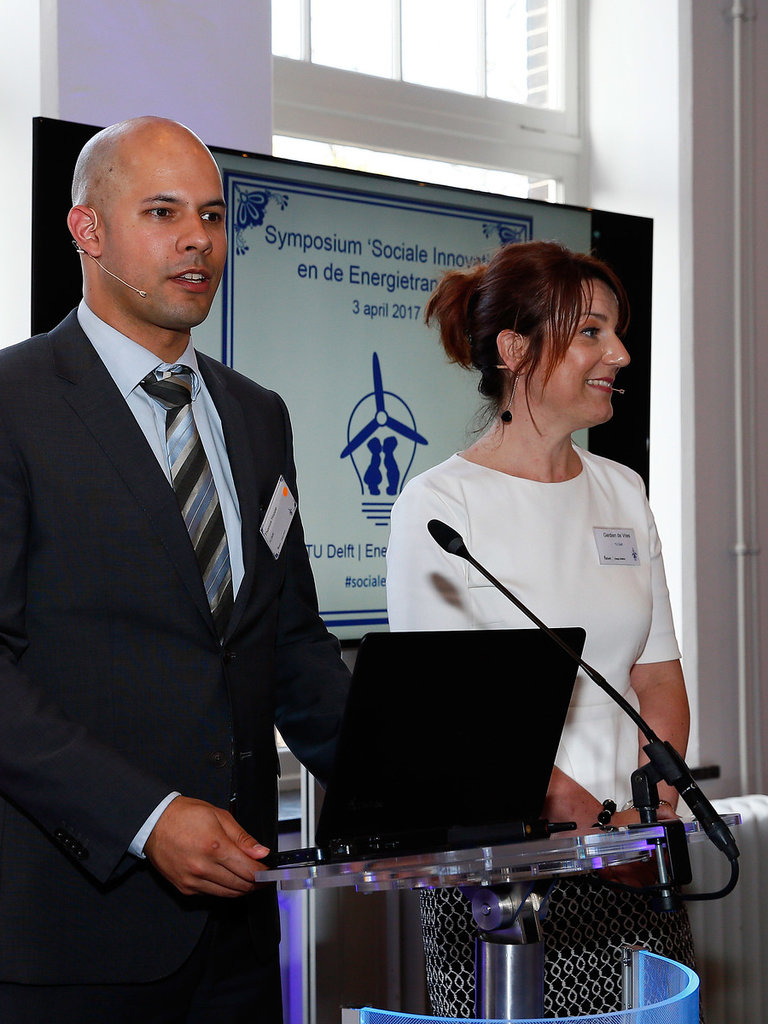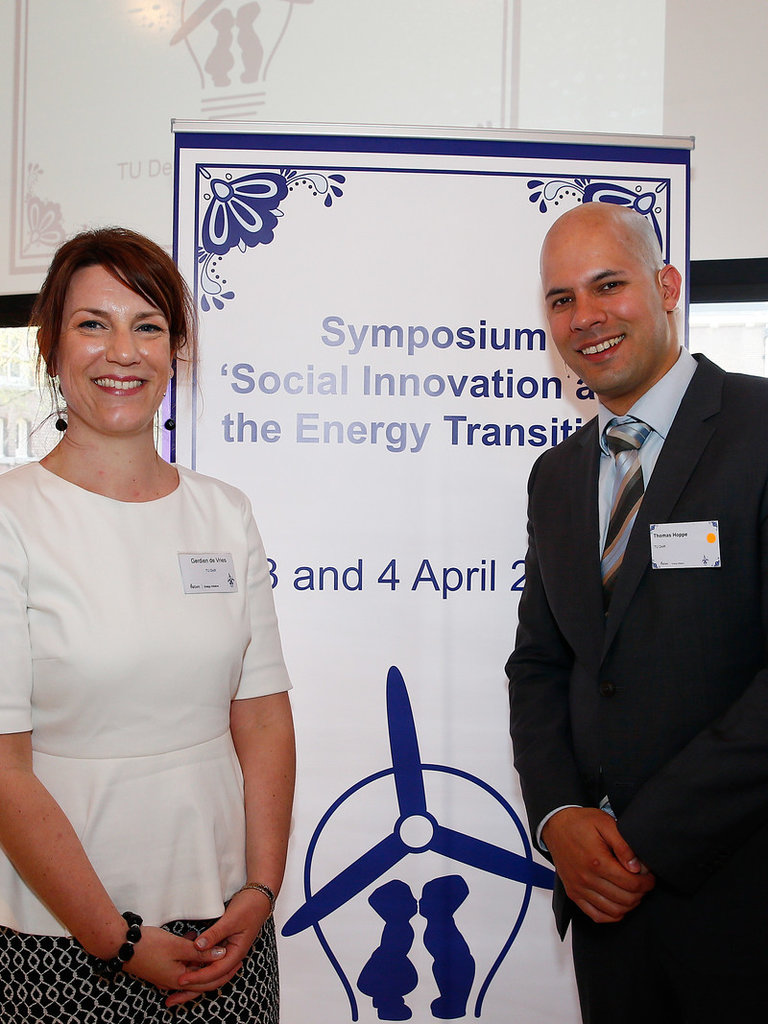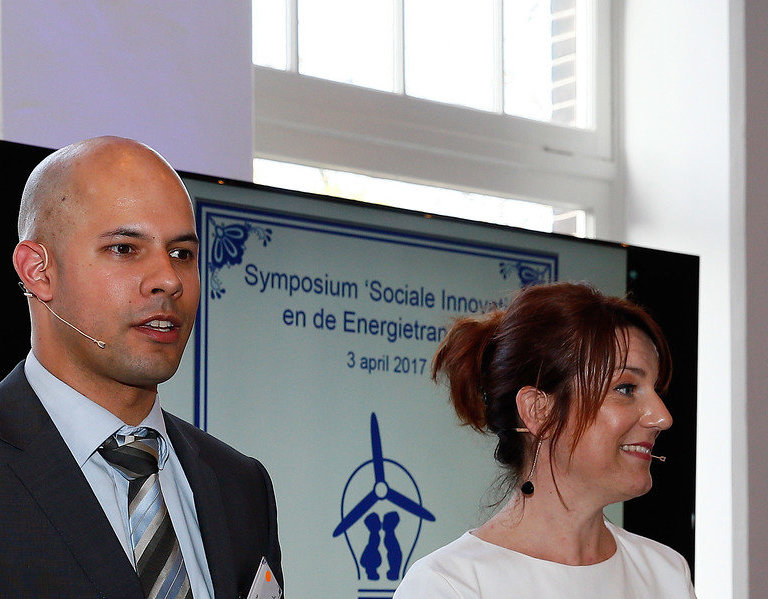
Technological projects, such as wind farms, solar arrays and underground storage of CO2 may be sustainable, safe and necessary, but if local residents feel short-changed or lied to, delays can ultimately result in total failure to deliver.
Behavioural scientist Gerdien de Vries, who completed her doctorate in Leiden, was brought to TU Delft for research into communication, influence and other social aspects involved in the introduction of new technology.
Together with public administration expert Thomas Hoppe, De Vries has been running TU Delft’s platform for Social Innovation and Energy since 2015. Focused on research, it also advises on policy and serves as a linchpin for socio-scientific research into energy transition in the Netherlands. A cornerstone of De Vries’ research is ‘social innovations in the energy transition’: new forms of behaviour, organisation, cooperation and communication about energy technology.
Why is this so important?
Gerdien de Vries: Because we are increasingly realising that if there is no support for technological innovations, they are doomed to failure. My doctorate focused on an analysis of the plans for underground CO2 storage in Barendrecht. Partly because of opposition from the local population, the plans ultimately failed to go ahead. They were worried about such issues as the risk of a CO2 leak. For the initiators, it was a hard lesson on the importance of the social and governance aspects of innovations.
Engineers tend to develop new technology with a view to its technical feasibility. Our research contributes to this and explores the conditions in which there is actually public support. When working on my doctorate, I explored how the private sector communicated about this type of environmental technology: I looked at how it was framed and what effect that had.
How do you research something like that?
Gerdien de Vries: I analysed how things were communicated, but also did experiments: I then created websites and tested them on people. They thought that they were genuine oil and gas company websites.
I then started changing individual details, for example the reason for investing in new technology. The company would then say: “We are doing this because we want to make a profit” or “We are doing this because it’s good for the environment”. You then see how people react.
What happens if an oil and gas company says that it’s investing in green technologies purely for environmental reasons? The answer is that people don’t believe it. It’s seen as greenwashing, because people also realise that it’s a company that ultimately wants to make a profit.
But as soon as they said “We are making a profit from it”, the whole idea of that hidden agenda disappeared. It was more in line with what people were expecting.
Now my focus is more on the type of communications strategy we should design, for example to make people consider the benefits of the technology. There’s still a lot to research, but you can derive the basic rules from my thesis: you need to report transparently and in a balanced way and to keep communications brief.
Don’t the technological project owners do that themselves automatically?
Gerdien de Vries: Ha ha, no, not automatically. In the Barendrecht case, we did mention the disadvantages for local residents, but they very much emphasised the advantages for the environment. This is what is known as emphasis framing. As a stakeholder company, it’s something to really watch out for. I call it the boomerang effect: just because you are so determined to convince people of the advantages, they feel saturated and start to dig their heels in.
On the other hand, it’s also very difficult to strike the right balance. This is because disadvantages have more of an impact on people than advantages. In addition, the disadvantages often affect a limited group of people, the local residents, whereas the advantages can be rather abstract, distant, and apply to everyone. This is seen as unfair.
Often, it’s not about the communication in itself, but about emotions and expectations. People feel that they are being treated unfairly or arrogantly. In Barendrecht, they felt that they had been involved at too late a stage and given too little say. The sense was that it was Shell, an ‘arrogant juggernaut’ in their eyes, who decided what they were going to do.
So if you are honest and balanced, do people come on board?
Gerdien de Vries: Sometimes engineers tend to think: “The risk is genuinely negligible. As long as people know what we know, they will become convinced. After all: it’s also dangerous living next to a petrol station, but people do that too.”
But this technocratic approach does not automatically work for new technologies from which people themselves have little to gain. Even a 0.001% chance of a leak or something exploding is something people simply want to avoid.
Thomas Hoppe: Everything in the energy transition has spatial implications. You have to find somewhere to organise the CO2 storage or build the wind farm or solar array. And the people who live or work in the immediate vicinity are unlikely to be very much in favour.
So the question is: how can you design the process in such a way as to increase the likelihood of parties in the local area agreeing to the plan? Obviously, it’s nonsense to believe that you can convince people if they have nothing to gain from it themselves. So as well as being the owners of the problem, you need to make them part-owners of the solution.
This is possible through co-creation and (shared) ownership. You need to devise a construction to go with it, a kind of social business model. This is an example of what we also mean by social innovations.

What is co-creation?
Thomas Hoppe: Co-creation is a form of participation in which citizens and other local stakeholders contribute their ideas. For example on how a wind farm should look and where it should be located.
In Denmark, they have a policy that stipulates that a wind farm is not only owned by a project developer, but that at least a quarter of it is owned by the local community. They can then earn money from it, enabling them to fund local socio-economic projects.

Another example is energy cooperatives involving local people who install their own energy panels or wind turbines in order to supply their own power. There has been a major upsurge in these in the Netherlands since 2010, where there are now more than 300 of these energy cooperatives. This is a great example of a social innovation.
What you often see is that the founders of this kind of cooperative were actively involved in the anti-nuclear movement and other environmental groups in the 1980s. Energy cooperatives often also include independent entrepreneurs: active go-getters who also try to persuade their neighbours to get on board.
But how does it work on major projects such as CO2 storage?
Gerdien de Vries: It is not that a group of people join forces to set it up, but that people are more effectively involved in the decision-making process. Or by finding something to offset it: a compensation scheme, for example. Money for a zebra crossing, traffic lights or a school swimming pool. Colleagues at Leiden University have conducted research on this: exploring when people consider it to be bribery, for example.
Thomas Hoppe: In a similar way to that, energy companies in Germany have been buying power from farmers generated from wind turbines installed on their land for many years: some have even become millionaires from it. This can also happen here in the Netherlands. But there may also be cases where the farmer is happy, and the rest of the local community is not.
Gerdien de Vries: In order to prevent that, you can also demand that farmers enlist the support of their neighbours.
Thomas Hoppe: I am cooperating with the renewable energy organisation ODE Decentraal whose activities include developing collective wind farms in the province of Flevoland. It can often take years to get farmers on board in support of a wind farm, but when this has been successful, there are usually no further problems.
Also, as part of the major European Horizon 2020 project ‘REScoop Plus’, we are conducting research into the extent to which energy cooperatives are successful in achieving energy savings for their members and convincing these members to invest in renewable energy.
Gerdien de Vries: The Energy Challenges are another example of a social innovation. They involve school students working on a campaign about climate change and energy, competing with other schools to develop the best campaign.
Interesting research questions include: What is the impact? And, does that also have an influence on the knowledge, attitudes and behaviour of parents, or of local businesses?
Thomas Hoppe: Earlier research has already shown that this can be successful.
In Saerbeck, for example, a village in Germany that serves as a model town in this respect: hundreds of administrators and civil servants from across the world visit it to see what they can learn about the local approach and how it can be ‘transplanted’ to their own town or region. The key question is: what are the crucial ingredients and conditions for enabling something like this to succeed and could it be rolled out on a larger scale?
Gerdien de Vries: Another area of research, that has actually been awarded a Nobel Prize for Economics is nudging: providing minor incentives to encourage people to take energy-saving measures. A nudge is a psychological push in the right direction. A famous example is the fly in the urinal.
We are working with the Energy Research Centre of the Netherlands (ECN) on a method for encouraging people to take energy-saving measures by sparing them as much effort as possible: so the person that comes to insulate your attic also helps to tidy it first and arranges temporary storage, for example. We know that people are not always only deterred by the cost, but also by the fuss involved. In training for government staff, the theme of nudging is now always covered.
What connection do you have with other researchers?
Thomas Hoppe: In Delft, energy research accounts for more than 900 FTEs, which I believe to be the highest figure in the Netherlands. With all the different disciplines, you have a nice variety of research that can contribute to the issue of how we can accelerate the energy transition.
Gerdien de Vries: I think that there is an increasing realisation of the role that we as social scientists can play in this. We are trying to raise this as an issue, for example by means of the symposium that we organised in Delft last April on social innovation in the energy transition. It would be great if we could provide an overarching platform here in Delft.
Hoppe: The energy transition has such social and political urgency that you could argue it should become a discipline in itself rather than just a field of application and this is something we would like to contribute to.
Do you have contacts with policymakers in government?
Thomas Hoppe: In Delft, we are very close to The Hague and there is a lot of collaboration with parties there, for example in the form of graduation assignments at various ministries.
The Ministry of Economic Affairs and Climate is in search of answers: what direction should energy policy take, what should be done about the energy cooperatives and the opposition to all those great wind farms we have come up with? They should have been up-and-running long ago and we have climate targets to achieve by 2020. What constitute smart participation processes? How can we ensure a fair distribution of costs and benefits in order to ensure that local communities also benefit?
TU Delft collaborates a lot with the government’s Energy Top Sector and we also have contact with the provinces, the municipalities of Delft and The Hague and with RVO.nl, the Netherlands Enterprise Agency that runs a lot of schemes relating to the energy transition.
Gerdien de Vries: There is also the social Energy Brigade, an initiative from the Energy Top Sector. As part of that, energy scientists are paired up with officials in local government, for example members of the provincial executives or municipal council members.
The Energy Brigade aims to highlight the importance and usefulness of socio-scientific and administrative research. For us, it is interesting to collaborate with people who are really dealing with the problems on the ground. Actually, we are like ambassadors for science.
Should people in government have more of a love for science?
De Vries: Politics will always exist and there will always be reasons why things are done in a different way than science might suggest. But I am convinced that the messages and lessons we have learned are gradually starting to filter into the public bodies, including ministries.
For example, projects in industry are increasingly taking account of processes of participation and involvement of the general public. There is a realisation that public support matters, perhaps almost as much as the technology itself.
